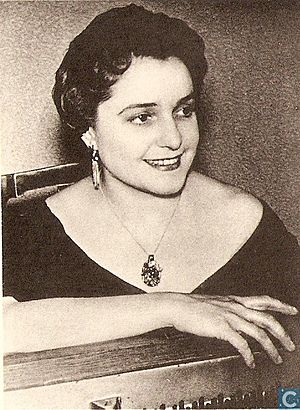Denise Tolkowsky facts for kids
Denise Tolkowsky (born August 11, 1918 – died March 9, 1991) was a talented English-born pianist and composer. She wrote many pieces of music and performed them too.
About Denise Tolkowsky
Denise Tolkowsky was born in Brighton, England. Her dad was from Russia, and her mom, Anna Kennes, was a singer and actress from Flanders. Denise loved music from a young age.
She studied music at the Royal Flemish Conservatory in Antwerp. There, she learned piano from E. Durlet and composition (how to write music) from Flor Alpaerts. She became a professional composer and a concert pianist, which means she performed music for audiences.
Denise married another pianist named Alex de Vries. They sometimes played music together as a duo. Sadly, Alex passed away in 1964. To honor him, Denise started the Alex de Vries Fund. This fund helps young musicians begin their careers, giving them a boost when they are just starting out.
In 1980, Denise became the director for the Flemish part of Yehudi Menuhin's 'Live Music Now' program. This program brings live music to people who might not usually hear it, like those in hospitals or care homes. Denise Tolkowsky passed away in Antwerp, Belgium.
Her Achievements
Denise Tolkowsky received several awards and honors for her musical talents. These included:
- International dance competition in Brussels, 1931
- International Viotti Competition in Italy, where she won a silver medal
- Young Talent competition in Brussels
- Ferris-Tolkowsky Prize
- Anna Kennedy Prize
What She Composed
Denise Tolkowsky wrote many different kinds of music. She composed pieces for the theater, for a full orchestra, for small groups of instruments (called a chamber ensemble), for solo piano, and for singers. She also wrote many songs.
Here are some of her well-known works:
- t kwezelke – a ballet from 1931
- Le Jeu du Coeur – another ballet, 1939
- People Of Earth – a ballet from 1939
- Camp – a piece for a mezzo-soprano (a type of singer) and a small orchestra, 1939
- Homage to Béla Bartók – a piece for flute, violin, piano, and percussion, 1950
- Adagio for Strings – a slow, beautiful piece for orchestra, 1950
- Sonatine – a short piece for piano
- Rhythmic – a piano piece focused on rhythm
- Etudes – piano pieces designed to help musicians practice certain skills
- Preludes – short piano pieces, often played as an introduction
- Variations – piano pieces that take a main tune and change it in different ways
- Concerto – a large piece for piano and orchestra, 1958
- Variations on a Russian theme – a piece from 1961 that changes a Russian folk tune
 | Delilah Pierce |
 | Gordon Parks |
 | Augusta Savage |
 | Charles Ethan Porter |


